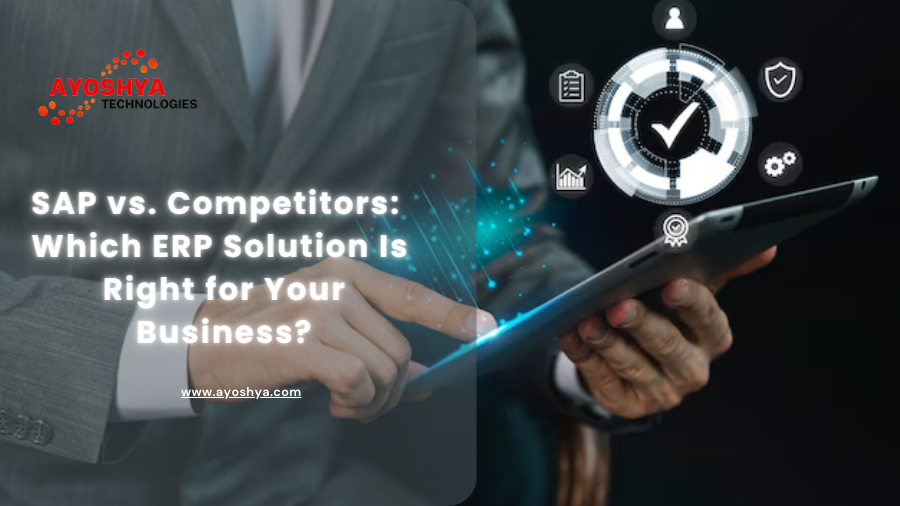SAP vs. Competitors: Which ERP Solution Is Right for Your Business?
Enterprise Resource Planning (ERP) systems are the backbone of modern businesses, helping organizations streamline their processes, manage resources, and make data-driven decisions. When it comes to ERP solution, SAP is a well-known name in the industry. However, it’s important to explore how SAP stacks up against its competitors to determine which ERP solution is the right fit for your business. In this blog, we’ll compare SAP to its competitors, highlighting key considerations to help you make an informed decision.
Understanding the Landscape
Before diving into the SAP vs. competitors comparison, it’s essential to understand that the ERP market is vast and diverse, with numerous players offering a wide range of solutions. Some of SAP’s primary competitors include Oracle, Microsoft Dynamics 365, and Salesforce, among others.
SAP: The Industry Giant
SAP is a global leader in ERP solution, known for its comprehensive suite of applications that cover various business functions. SAP offers solutions for finance, human resources, supply chain, procurement, and more. Its flagship product, SAP S/4HANA, is a next-generation ERP suite designed to deliver real-time insights, enhance efficiency, and drive digital transformation.
Oracle: The Rival Titan
Oracle is another major player in the ERP market. Known for its Oracle ERP Cloud, it provides a robust platform for financial management, procurement, project management, and supply chain operations. Oracle is particularly strong in industries like manufacturing, construction, and retail.
Microsoft Dynamics 365: The Integration Expert
Microsoft Dynamics 365 is Microsoft’s ERP and CRM (Customer Relationship Management) solution. It offers a cloud-based platform that integrates seamlessly with other Microsoft products, such as Office 365. Dynamics 365 is known for its user-friendly interface and flexibility, making it a popular choice for businesses of all sizes.
Salesforce: The CRM Leader with ERP Capabilities
Salesforce is primarily recognized for its CRM solutions, but it has expanded its offerings to include ERP capabilities through Salesforce ERP Cloud. While it may not be as comprehensive as SAP or Oracle in terms of ERP functionality, it excels in customer-centric industries.
Key Considerations for Your Business
Now that we’ve introduced some of SAP’s primary competitors, let’s explore key considerations to help you determine which ERP solution aligns best with your business needs:
1. Business Complexity
- SAP: Ideal for large enterprises with complex, multifaceted operations and global reach.
- Oracle: A strong choice for mid-sized to large businesses, especially in industries with intricate supply chains.
- Microsoft Dynamics 365: Suitable for businesses of various sizes, with a focus on user-friendly interfaces.
- Salesforce: Primarily tailored for customer-centric businesses that require robust CRM capabilities with some ERP functionalities.
2. Industry Focus
- SAP: Offers industry-specific solutions for various sectors, including manufacturing, retail, healthcare, and more.
- Oracle: Strong presence in industries like manufacturing, construction, and retail.
- Microsoft Dynamics 365: Versatile and adaptable across industries.
- Salesforce: Primarily excels in customer-centric industries like sales, marketing, and service.
3. Integration Needs
- SAP: Offers extensive integration capabilities but may require more customization for specific integrations.
- Oracle: Known for its robust integration capabilities and interoperability with other Oracle products.
- Microsoft Dynamics 365: Seamlessly integrates with other Microsoft products, simplifying collaboration.
- Salesforce: Strong integration with Salesforce CRM but may require additional customization for more complex integrations.
4. Budget and Cost Considerations
- SAP: Typically comes with a higher upfront cost and ongoing maintenance fees.
- Oracle: Offers various licensing options, making it adaptable to different budget constraints.
- Microsoft Dynamics 365: Known for its flexibility and scalability, with different pricing tiers to suit varying budgets.
- Salesforce: Offers a range of pricing options, with more flexibility for scaling up or down.
5. User Experience and Adoption
- SAP: Known for robust functionality but may require comprehensive training and change management.
- Oracle: Offers a user-friendly interface but may require customization to match specific workflows.
- Microsoft Dynamics 365: Known for its user-friendly interface and seamless integration with familiar Microsoft tools.
- Salesforce: Excels in user experience and may require less training for CRM-focused roles.
Conclusion: Choosing the Right ERP Solution
Selecting the right ERP solution for your business involves a detailed analysis of your organization’s specific needs, industry requirements, budget constraints, and scalability plans. While SAP is a formidable contender in the ERP arena, its competitors offer unique strengths and cater to diverse business scenarios. Carefully evaluate each ERP solution, considering the factors mentioned above, to make an informed decision that aligns with your digital transformation goals and contributes to the growth and success of your business.



